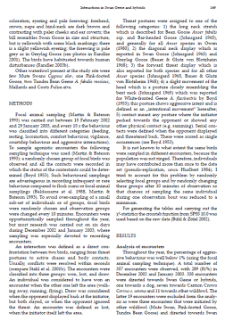- Search in all Repository
- Literature and maps
- Archeology
- Mills database
- Natural sciences
Advanced search
Advanced search
Advanced search
Advanced search
Advanced search

Object
Title: Polyterritoriality and the First Record of Polygyny in the Red-Breasted Flycatcher Ficedula parva in a Primeval Forest
Subtitle:
Przypadki politerytorializmu i pierwsze stwierdzenie poligynii u muchołówki małej ; Short notes
Contributor:
Museum and Institute of Zoology, Polish Academy of Sciences
Publisher:
Museum and Institute of Zoology, Polish Academy of Sciences
Place of publishing:
Description:
Type of object:
Abstract:
Territoriality in Red-breasted Flycatchers was studied in the Białowieża Forest of Eastern Poland during five consecutive breeding seasons (2000–2004). In total 99 males were individually marked, and evidence of polyterritoriality was found in 10% of them. The proportion of polyterritorial males varied from 0% (in 2003) to 13.6% (in 2001). The mean distance between the first and second territories was 278 m (± 179.37, n = 10). The rate of polyterritoriality was not related to age class, as older males defended dual territories that were, on average, not more distantly separated than those of younger males. One case of polygyny was recorded. To our knowledge, this is the first evidence for polyteritoriality and polygyny in male Red-breasted Flycatchers.
Relation:
Volume:
Issue:
Start page:
End page:
Detailed Resource Type:
Format:
Resource Identifier:
oai:rcin.org.pl:55548 ; 10.3161/068.040.0203
Source:
MiIZ PAN, call no. P.257 ; MiIZ PAN, call no. P.4568
Language:
Language of abstract:
Rights:
Terms of use:
Copyright-protected material. May be used within the limits of statutory user freedoms
Digitizing institution:
Museum and Institute of Zoology of the Polish Academy of Sciences
Original in:
Library of the Museum and Institute of Zoology of the Polish Academy of Sciences
Projects co-financed by:
Programme Innovative Economy, 2010-2014, Priority Axis 2. R&D infrastructure ; European Union. European Regional Development Fund
Access:
Object collections:
- Digital Repository of Scientific Institutes > Partners' collections > Museum and Institute of Zoology PAS > Scientific Journals
- Digital Repository of Scientific Institutes > Partners' collections > Museum and Institute of Zoology PAS > MIZ PAN Publications > Acta Ornithologica
- Digital Repository of Scientific Institutes > Literature > Journals/Articles
Last modified:
Feb 4, 2025
In our library since:
Jul 28, 2015
Number of object content downloads / hits:
14
All available object's versions:
https://rcin.org.pl./publication/75780
Show description in RDF format:
Show description in RDFa format:
Show description in OAI-PMH format:
Objects Similar
Mitrus, Cezary Soćko, Beata
Walankiewicz, Wiesław Mitrus, Cezary
Walankiewicz, Wiesław Czeszczewik, Dorota Mitrus, Cezary Szymura, Arkadiusz
Mitrus, Cezary Walankiewicz, Wiesław Czeszczewik, Dorota Jabłoński, Piotr M.
Walankiewicz, Wiesław Mitrus, Cezary Czeszczewik, Dorota Jabłoński, Piotr M.
Wesołowski, Tomasz (1950– ) Tomiałojć, Ludwik (1939– ) Mitrus, Cezary Rowiński, Patryk Czeszczewik, Dorota
Mitrus, Cezary Rogala, Beata

 INSTYTUT ARCHEOLOGII I ETNOLOGII POLSKIEJ AKADEMII NAUK
INSTYTUT ARCHEOLOGII I ETNOLOGII POLSKIEJ AKADEMII NAUK
 INSTYTUT BADAŃ LITERACKICH POLSKIEJ AKADEMII NAUK
INSTYTUT BADAŃ LITERACKICH POLSKIEJ AKADEMII NAUK
 INSTYTUT BADAWCZY LEŚNICTWA
INSTYTUT BADAWCZY LEŚNICTWA
 INSTYTUT BIOLOGII DOŚWIADCZALNEJ IM. MARCELEGO NENCKIEGO POLSKIEJ AKADEMII NAUK
INSTYTUT BIOLOGII DOŚWIADCZALNEJ IM. MARCELEGO NENCKIEGO POLSKIEJ AKADEMII NAUK
 INSTYTUT BIOLOGII SSAKÓW POLSKIEJ AKADEMII NAUK
INSTYTUT BIOLOGII SSAKÓW POLSKIEJ AKADEMII NAUK
 INSTYTUT CHEMII FIZYCZNEJ PAN
INSTYTUT CHEMII FIZYCZNEJ PAN
 INSTYTUT CHEMII ORGANICZNEJ PAN
INSTYTUT CHEMII ORGANICZNEJ PAN
 INSTYTUT FILOZOFII I SOCJOLOGII PAN
INSTYTUT FILOZOFII I SOCJOLOGII PAN
 INSTYTUT GEOGRAFII I PRZESTRZENNEGO ZAGOSPODAROWANIA PAN
INSTYTUT GEOGRAFII I PRZESTRZENNEGO ZAGOSPODAROWANIA PAN
 INSTYTUT HISTORII im. TADEUSZA MANTEUFFLA POLSKIEJ AKADEMII NAUK
INSTYTUT HISTORII im. TADEUSZA MANTEUFFLA POLSKIEJ AKADEMII NAUK
 INSTYTUT JĘZYKA POLSKIEGO POLSKIEJ AKADEMII NAUK
INSTYTUT JĘZYKA POLSKIEGO POLSKIEJ AKADEMII NAUK
 INSTYTUT MATEMATYCZNY PAN
INSTYTUT MATEMATYCZNY PAN
 INSTYTUT MEDYCYNY DOŚWIADCZALNEJ I KLINICZNEJ IM.MIROSŁAWA MOSSAKOWSKIEGO POLSKIEJ AKADEMII NAUK
INSTYTUT MEDYCYNY DOŚWIADCZALNEJ I KLINICZNEJ IM.MIROSŁAWA MOSSAKOWSKIEGO POLSKIEJ AKADEMII NAUK
 INSTYTUT PODSTAWOWYCH PROBLEMÓW TECHNIKI PAN
INSTYTUT PODSTAWOWYCH PROBLEMÓW TECHNIKI PAN
 INSTYTUT SLAWISTYKI PAN
INSTYTUT SLAWISTYKI PAN
 SIEĆ BADAWCZA ŁUKASIEWICZ - INSTYTUT TECHNOLOGII MATERIAŁÓW ELEKTRONICZNYCH
SIEĆ BADAWCZA ŁUKASIEWICZ - INSTYTUT TECHNOLOGII MATERIAŁÓW ELEKTRONICZNYCH
 MUZEUM I INSTYTUT ZOOLOGII POLSKIEJ AKADEMII NAUK
MUZEUM I INSTYTUT ZOOLOGII POLSKIEJ AKADEMII NAUK
 INSTYTUT BADAŃ SYSTEMOWYCH PAN
INSTYTUT BADAŃ SYSTEMOWYCH PAN
 INSTYTUT BOTANIKI IM. WŁADYSŁAWA SZAFERA POLSKIEJ AKADEMII NAUK
INSTYTUT BOTANIKI IM. WŁADYSŁAWA SZAFERA POLSKIEJ AKADEMII NAUK




































